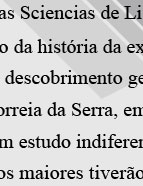

................................
"In my view, Portuguese history seems to be naturally divided into two major cycles, each of which covers several social phases, or epochs: the first is that in which the nation is constituted; the second is that of its rapid decadence: the former is the Middle Ages; the latter is the Renaissance." He even went so far as to consider "the whole sixteenth century a century of decadence." (Opusculos [Booklets], vol. V, undated., pp. 126-127). He dated the beginning of this catastrophic collective depression back to the 1482 Cortes [assembly of the representatives of the estates of the kingdom] in Évora. He went even further: "neither discoveries, nor conquests, nor trade established by virtue of the sword, nor the luxury and majesty of an immense empire can teach us social wisdom today. (Ibid., p. 135) However, the discoveries, undoubtedly the most brilliant tale of collective existence, opened up to the decadence that would sink the Homeland, leading to its fall into the hands of King Felipe II. Indeed, the Discoveries, by virtue of the royal absolutism that eliminated citizen freedoms, were the expression of that fatality.
Friar Francisco de S. Luís, a liberal, later known as Cardinal Saraiva, collected materials and produced the first well-organised chronologies, listing sources and citing the most important figures in the history of expansion during his political seclusion - "forced and painful leisure" - from 1828 to 1834 in the Serra de Ossa. The diligent writer compiled his findings in the Indice Chronologico das navegações, viagens, descobrimentos, e conquistas dos portugueses nos paizes ultramarinos desde o principio do século XV [Chronological Index of the navigations, voyages, discoveries, and conquests of the Portuguese in overseas countries from the early 15th century]. Despite the presumed "secrecy" under which he read the documents, making this a complex and demanding analysis, he was confronted with multiple difficulties in gaining access to testimonies, which thus conditioned the writing of the "series of our overseas undertakings." (Saraiva, Obras Completas [Complete Works] tome V, p. 48) "as history". In this Indice Cronologico [Chronological Index] he briefly referred to "the facts deemed most important, putting them in their purely chronological order, so as to be used as a guide, whenever we wished to expand our study, or learn more widely about this branch of our history, which we consider of as much interest to the literati, as glorious to the Portuguese." (Ibid., p. 49) This was probably the first attempt at a comprehensive presentation of what was known about the overseas discoveries and accomplishments between 1412 and 1811.
